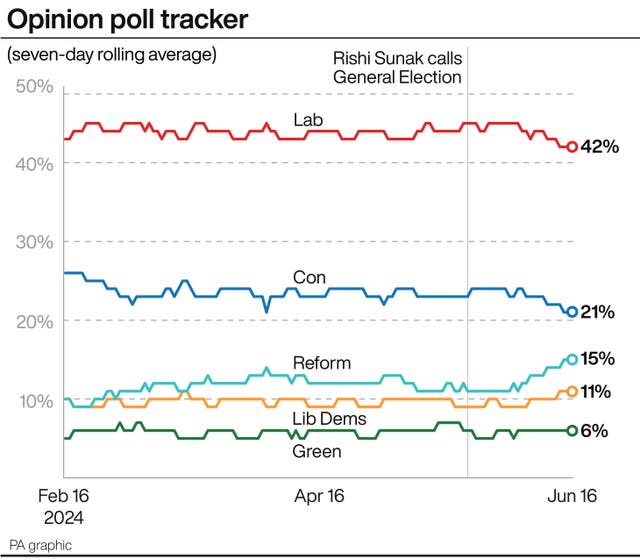Rachel Reeves will highlight Labour’s plans to boost investment by breaking down EU trade barriers and set up a national wealth fund as she kicks off a week of campaigning on the economy.
The shadow chancellor suggested she could revise parts of Boris Johnson’s 2020 Brexit deal, including seeking closer alignment with EU rules in the chemicals and veterinary sectors, better touring rights for UK artists, and greater mutual recognition of qualifications for financial services workers.
She said this was not an “exclusive” list, telling the Financial Times: “We would look to improve our trading relationship with Europe.
“I don’t think anyone voted Leave because they were not happy that chemicals regulations were the same across Europe.”
She emphasised the benefits of a mutual recognition deal for professional qualifications, saying: “The majority of people in the City have not regarded Brexit as being a great opportunity for their business.”
Her remarks appear to suggest that Labour would go further than previously thought in pushing for improved trade terms with the bloc, having so far been hesitant to discuss Brexit during the election campaign.
The Labour frontbencher will meet members of her British infrastructure council on Monday morning to discuss attracting foreign investors who had been deterred by political instability in the UK.
Bosses from Lloyds, Santander and M&G are among the group convened by Ms Reeves, who said Labour would “hit the ground running to show that Britain is open for business” by holding a global investment summit in the first 100 days of entering government.
Ms Reeves is later on Monday expected to make a campaign visit with Sir Keir Starmer to promote their national wealth fund proposal.
The party has pledged to invest £7.3 billion in the fund over the course of the next Parliament if it wins the General Election to help create 650,000 new jobs.
Ms Reeves will announce a target for the fund to unlock business investment, with it required to crowd-in a further £3 of private sector investment for every £1 of public investment.
Its investments would include £2.5 billion to rebuild the steel industry, £1.8 billion to upgrade ports and build supply chains, and £1.5 billion in the automotive industry.
Labour says the national wealth fund is central to its green prosperity plan, delivering billions in private sector green investment to help the transition to net zero.
The plans would help to “re-industrialise” the UK with 650,000 high-quality jobs for plumbers, electricians, engineers and technicians created in the next five years across the country, according to the party.
The task force advising Labour on how to implement its national wealth fund would be asked to report back shortly after polling day, the shadow chancellor will confirm.
The panel, set up in March, comprises leading figures from the UK’s investment and financial services sector including former Bank of England governor Mark Carney and Barclays chief CS Venkatakrishnan.
Ms Reeves said: “Labour’s plan for growth is about making Britain better off, with good jobs paying a decent wage being created right across the United Kingdom.

“The election on July 4 is a chance to deliver on that plan and to turn our economy around after 14 years of Conservative decline. The next Labour government will work hand-in-hand with the private sector to bring investment to Britain’s industrial heartlands and I have been clear that our national wealth fund will be a crucial tool in the armoury to deliver on this ambition.
“This election is about change: stability with a changed Labour Party that will make you better off or five more years of chaos from the Conservatives that will mean £4,800 more on your mortgage.”
Driving economic growth was the overall focus of the manifesto Labour unveiled last week, as it sought to paint the Conservatives as the party of economic chaos.
Ms Reeves has repeatedly promised not to “play fast and loose with the public finances” as Labour attempts to shake off Tory accusations that it would “bankrupt the country”, and to portray itself as a safe pair of hands in difficult economic times.
